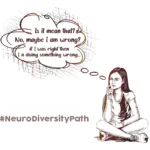Have you ever found yourself trapped in the relentless grip of self-condemnation, unable to break free from the chains of regret and guilt? What if I told you that forgiveness, even of oneself, is not only possible but also transformative? In this journey of self-discovery and healing, we will explore five powerful steps to help you break free from the shackles of self-blame and embrace the liberating power of self-forgiveness. Through practical guidance and heartfelt insights, this article promises to illuminate the path toward self-compassion, inner peace, and the profound freedom of letting go of the past.

1- Confronting the Inner Critic: Understanding the Need for Self-Forgiveness
– Recognizing the Inner Critic
The journey towards self-forgiveness begins with acknowledging the presence of our inner critic, that relentless voice within us that whispers words of self-doubt and condemnation. Recognize that this inner critic often stems from deeply ingrained beliefs and societal expectations. It thrives on perfectionism and unrealistic standards, fueling feelings of inadequacy and shame. Take a moment to observe the patterns of self-talk that arise within you. Are you excessively self-critical, replaying past mistakes and shortcomings? By shining a light on the presence of your inner critic, you take the first step towards reclaiming control over your self-perception.
– Understanding the Impact
The inner critic erodes our self-esteem and hinders our ability to forgive ourselves. Research in psychology has shown that self-criticism is strongly associated with increased levels of depression, anxiety, and stress. Moreover, it creates a barrier to self-forgiveness by perpetuating feelings of unworthiness and self-blame. Recognize that self-forgiveness is not a sign of weakness but rather an act of courage and compassion towards oneself. By understanding the detrimental impact of the inner critic, you can begin to challenge its validity and cultivate a more forgiving attitude towards yourself.
2- Cultivating Self-Compassion: Embracing Imperfection and Growth
– Embracing Imperfection
Self-compassion allows us to embrace imperfection and fosters personal growth and development. When we approach ourselves with kindness and understanding, we are more likely to persevere in facing challenges. Research conducted by psychologist Carol Dweck at Stanford University has demonstrated the importance of adopting a “growth mindset” for achieving success. Individuals with a growth mindset view setbacks as temporary opportunities for learning and growth. By fostering a growth mindset within yourself, you can reframe failures as valuable lessons on the path to self-improvement. Celebrate your progress and accomplishments, no matter how small, and remember that growth is a lifelong journey.
– Fostering Growth
Self-compassion allows us to embrace imperfection and fosters personal growth and development. When we approach ourselves with kindness and understanding, we are more likely to persevere in facing challenges. Research conducted by psychologist Carol Dweck at Stanford University has demonstrated the importance of adopting a “growth mindset” for achieving success. Individuals with a growth mindset view setbacks as temporary opportunities for learning and growth. By fostering a growth mindset within yourself, you can reframe failures as valuable lessons on the path to self-improvement. Celebrate your progress and accomplishments, no matter how small, and remember that growth is a lifelong journey.
– Practicing Self-Compassion Daily
Self-compassion is a skill that can be cultivated through daily practice. Set aside dedicated time each day to engage in self-compassionate practices, such as meditation, journaling, or positive affirmations. Treat yourself with the same kindness and care you would offer a loved one. When faced with challenges or setbacks, offer yourself words of encouragement and support. Remember that self-compassion is not about indulgence or self-pity but rather about acknowledging your humanity and inherent worth. As you integrate self-compassion into your daily life, you’ll find that self-forgiveness becomes a natural and empowering process.
3- Releasing Regret: Strategies for Letting Go of Past Mistakes
– Understanding the Impact of Regret
Regret can weigh heavily on the soul, trapping us in a cycle of self-blame and rumination. Research conducted by psychologist Neal Roese at Northwestern University has shown that regret can have significant negative effects on mental health, leading to increased levels of stress, anxiety, and depression. It’s essential to acknowledge its impact on our well-being to break free from the grip of regret. Take a moment to reflect on how holding onto past mistakes has affected your life. Have you been carrying around feelings of guilt and shame? Has regret prevented you from fully embracing the present moment and moving forward with your life? By recognizing the toll that regret takes on our mental and emotional health, we can begin to explore strategies for releasing its grip.
– Letting Go of Past Mistakes
Letting go of past mistakes is essential for cultivating self-forgiveness and moving forward with our lives. One powerful strategy for releasing regret is practicing self-compassion. According to psychologist Kristin Neff, self-compassion involves treating ourselves with kindness and understanding, especially in moments of suffering or failure. By extending compassion to ourselves for our mistakes, we can begin to let go of guilt and shame. Another effective strategy is reframing our perspective on past mistakes. Instead of viewing them as failures, see them as opportunities for growth and learning. By reframing our mistakes in this way, we can extract valuable lessons and wisdom from them rather than allowing them to weigh us down with regret.
4- Healing Wounds: Navigating the Journey of Self-Forgiveness
The journey of self-forgiveness is not always easy, but it is essential for our emotional well-being and growth. To begin the healing process, it’s crucial to confront the pain and wounds inflicted upon us, whether by others or by ourselves. Acknowledge the hurt and its impact on your life, but also recognize that holding onto resentment and anger only perpetuates your suffering. Practice forgiveness not as a way to condone or excuse the actions that caused the pain but as a means of freeing yourself from their grip. Remember that forgiveness is a journey, and it may take time to let go of past hurts fully. Be patient and compassionate with yourself as you navigate this process, and remember that healing is possible.
5- Embracing Redemption: Finding Peace and Wholeness in Self-Acceptance
– Embracing Imperfection
Self-acceptance is the cornerstone of self-forgiveness, offering us a pathway to peace and wholeness. To embrace redemption, we must first acknowledge and accept ourselves as we are, flaws and all. This means letting go of unrealistic expectations and embracing our inherent worthiness. Research in psychology has shown that self-acceptance is strongly linked to greater life satisfaction and psychological well-being. Embracing our imperfections with compassion and understanding creates space for self-forgiveness to flourish.
– Finding Peace
Finding peace within ourselves is essential for experiencing true redemption and healing. This requires letting go of the need for external validation and finding solace in our own inner worth. Practice mindfulness and self-compassion to cultivate a sense of inner peace and tranquility. Remember that peace is not found in perfection but in acceptance of ourselves as imperfect beings.
– Cultivating Wholeness
Self-acceptance allows us to embrace our whole selves, including the parts we may have previously rejected or denied. We can experience a sense of wholeness and integration by embracing all aspects of ourselves. This wholeness enables us to move forward with greater clarity, purpose, and authenticity. Remember that self-acceptance is a journey, and it may require patience and perseverance. But through this journey, we can find peace, redemption, and a profound sense of self-love.
“In the end, forgiveness is an act of self-love. When we forgive ourselves, we heal ourselves”
Yung Pueblo
In the journey of self-forgiveness, we have explored the transformative power of embracing imperfection, cultivating self-compassion, and finding peace within ourselves. We pave the way for healing and wholeness by acknowledging our wounds, practicing forgiveness, and embracing redemption. As I reflect on these insights, I’m reminded of the profound resilience of the human spirit and the capacity for growth and transformation that lies within each of us. The path to self-forgiveness is not always easy, but it is a journey worth embarking on toward greater self-acceptance, peace, and fulfillment. So, I invite you to embrace the process of self-forgiveness with an open heart and a gentle spirit. Let’s cultivate a deeper sense of compassion and understanding towards ourselves and others.
What are your thoughts on self-forgiveness? Share your reflections below.





